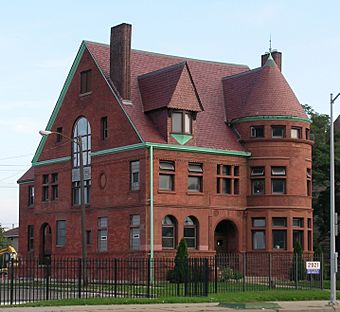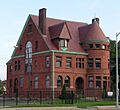John N. Bagley House facts for kids
Quick facts for kids |
|
|
John N. Bagley House
|
|
 |
|
| Location | 2921 East Jefferson Avenue Detroit, Michigan |
|---|---|
| Built | 1889 |
| Architect | Rogers and MacFarlane |
| Architectural style | French Renaissance Revival |
| MPS | East Jefferson Avenue Residential TR |
| NRHP reference No. | 85002934 |
| Added to NRHP | October 09, 1985 |
The John N. Bagley House is a historic home located at 2921 East Jefferson Avenue in Detroit, Michigan. It was officially added to the National Register of Historic Places in 1985. This means it is a special building recognized for its history and unique design.
Contents
What Does the Bagley House Look Like?
The Bagley House is a large, two-and-a-half-story mansion. It is built using dark bricks and brown stone. The house features a style called French Renaissance Revival. This style brings back ideas from the European Renaissance period.
Who Designed This Unique House?
The house was designed by a Detroit company called Rogers and MacFarlane. For a while, people thought another firm designed it. This was because the Bagley family had also hired a famous architect named H. H. Richardson for another project, the Bagley Memorial Fountain.
Special Features of the House
The Bagley House has a very large roof with a pointed top, known as a gable roof. It also has a tall tower with a cone-shaped roof. The main entrance is built into a round archway. A special window, called a bay window, sticks out from the roof. The outside of the house has many interesting details. These include sculptures around the entrance made by an artist named Julius Melchers.
Why Is the Bagley House Important?
This house was built in 1889 for John N. Bagley. He was the son of John J. Bagley, who used to be the governor of Michigan. The John N. Bagley House is one of the oldest French Renaissance Revival mansions still standing in Detroit from the 1800s.
The Bagley Family's Legacy
The Bagley family also asked for the Bagley Memorial Fountain to be built. This fountain was designed in a style called Romanesque Revival architecture. It is the only remaining work in the Detroit area by the famous architect Henry Hobson Richardson. Even though the house itself wasn't designed by Richardson, it shares some similar design ideas. It is still considered one of Detroit's finest houses with a Richardsonian Romanesque feel.
Images for kids
See also
 | Emma Amos |
 | Edward Mitchell Bannister |
 | Larry D. Alexander |
 | Ernie Barnes |


